It turns out investors probably should heed those national park signs warning hikers to “Beware of Bears.”
In a 1966 Newsweek article, the eminent economist Paul Samuelson famously quipped that the stock market had predicted nine of the past five recessions. It’s a remark that is often repeated to deride the powers of the stock market to predict the economy.
CNBC went back to see if Samuelson was right and, if so, does he remain right? As the gauge of the market, we looked at all the bear markets of the postwar era, using data compiled by the financial research firm Bespoke, where stocks fell 20 percent, stayed down for longer than a month and where there was no 20 percent rally.
Before getting to the current results, the first thing we found is that Samuelson was technically wrong, but right in spirit. Using data from his day, he actually understated how lousy the market was at predicting recessions, at least by the standards we employed. When Samuelson wrote in 1966, the market was nearing the end of an eight-month-long bear market, one that would not lead to a recession. In fact, the previous nine bear markets starting in 1966 led to just three recessions.
The current results show Samuelson’s quip was spot on. There have been 13 bear markets in the postwar era. These 13 bear markets have led to recessions seven times within about 12 months. So instead of Samuelson’s 9 of 5 (think about it like shooting 55 percent), it’s really 13 of 7 (53 percent). Pretty impressive for a quip.
(Down about 10 percent from the highs, the market remains a long way from our bear market recession indicator, though economists have been raising the probability of one.)
On average, bear markets give investors about eight months of warning that a recession is on the way. That is, the average recession after a bear market doesn’t begin until 253 days later. But there’s a wide range: The 2007 recession began just 53 days after the 2007 bear market began. But it took 367 days before the November 1968 bear market yielded to the 1969 recession. (We counted that as a success for bear market predictions because it was only two days outside of the one-year limit).
[“source -pcworld”]


